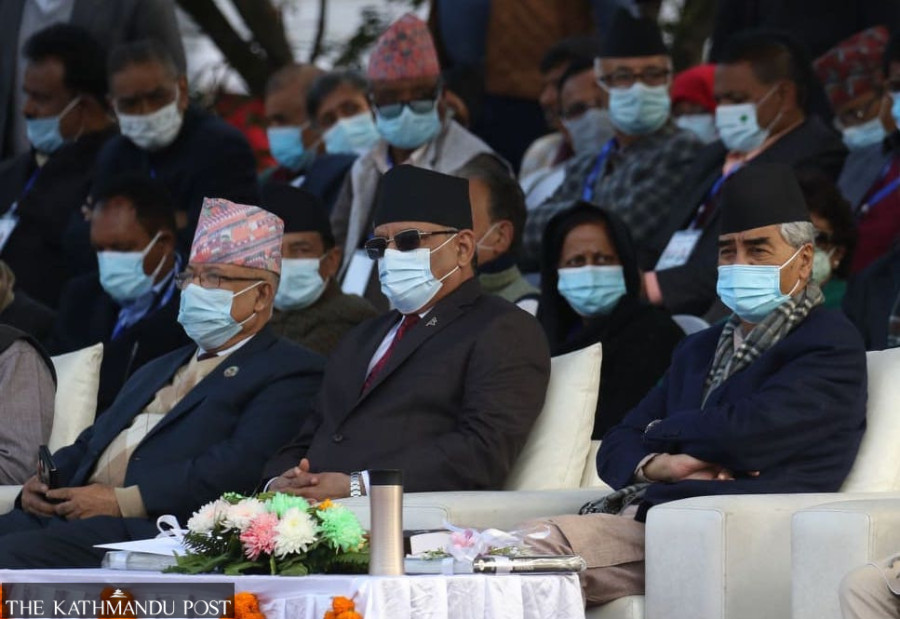Politics
As coalition’s poll alliance conundrum continues, Congress to decide on Friday
CPN (Maoist Centre) and CPN (Unified Socialist), with their options limited, ratchet up the rhetoric.
Tika R Pradhan
As the local election date is approaching, confusion has deepened among ruling coalition partners, particularly the Nepali Congress, the Communist Party of Nepal (Maoist Centre) and the CPN (Unified Socialist), over an electoral alliance.
While the Maoist Centre has been making vague claims that it has not closed the door for an alliance with the CPN-UML, the Unified Socialist, which has the least option, has resorted to rhetoric.
For both communist forces need the Congress, which, however, is divided on whether to take them along.
On Sunday, Nepali Congress spokesperson Prakash Sharan Mahat said the party’s upcoming Central Working Committee meeting which will begin Friday will decide on whether or not to forge an electoral alliance with the existing parties in the ruling coalition.
“Our Central Working Committee meeting will decide in principle on whether the party should forge an electoral alliance or not,” said Mahat.
Congress President Sher Bahadur Deuba, who was appointed prime minister on July 13 with the backing of the two communist forces, has at least on one occasion made a public statement that elections will be fought under an alliance with coalition partners.
This, however, did not go down well with a section of Congress members, including party general secretary Gagan Thapa, senior leader Shekhar Koirala who lost party presidency to Deuba, and party vice president Dhanaraj Gurung.
“All the parties aim to win the most number of seats in the elections. We will do whatever is necessary to increase our seats,” said Mahat.
In 2017, during the first of the three phases of local polls, the Maoist Centre had forged an electoral alliance with the Nepali Congress but had joined hands with the UML betraying the Congress even when the Maoist party was in the government. In May 2018, it merged with the UML to form the Nepal Communist Party (NCP).
The Unified Socialist, led by Madhav Nepal, was not even born.
During the 2017 local polls, the UML emerged as the biggest winner with 171 chairs, 194 vice-chairs and 123 mayors, and 137 deputy mayors throughout the nation compared to Congress’ 161 chairs, 139 vice-chairs, 105 mayors, and 84 deputy mayors. The Maoist Centre had won 72 chairs, 68 vice-chairs, 34 mayors and 43 deputy mayors.
Since Madhav Nepal’s Unified Socialist was formed in August last year after they split from the UML, there’s no exact number on the number of local representatives that belong to the party.
“Since the prime minister has publicly stated why an electoral alliance is necessary,” said Madhav Nepal, “we are waiting for the Congress’ official decision on the alliance.”
Asked what if the Congress takes a decision not to forge an alliance, Nepal said it will be too early to speak on the next plan.
“Let’s wait for the Congress to decide. We will speak only after the decision comes,” Nepal told the Post. “It’s not good to reveal our plan early. That could spoil the environment.”
He, however, ruled out an electoral alliance with the UML.
The Maoist Centre, which is also in a precarious position, however, has continued its double game.
Maoist chair Pushpa Kamal Dahal, who has proved to be a leader who keeps changing his mind, has continued his doublespeak.
On Sunday, Dahal said in Pokhara that his party will have to seek options if the [Congress] leaders like Dhanaraj Gurung keep on making caustic comments which they cannot stand.
“If some Congress leaders continue to maintain such harsh positions, we will have to look for alternatives,” said Dahal while speaking at a function in Pokhara. “Exploring options does not necessarily mean we are forging an alliance with the UML though. We are still in favour of continuing with this coalition.”
That politics is a game of immense possibilities has been Dahal’s refrain, which he has been using over the years for his personal benefit.
A few days ago, Maoist leader Barshaman Pun ratcheted up rhetoric, warning Congress leaders not to speak against the alliance because the Maoists could send Congress back to the streets.
“We have taken the Congress which was in the streets to power and therefore we could also send them back to the streets again if they speak arbitrarily against the Maoists,” Pun said, warning those Congress leaders who are against an electoral alliance.
Some Congress leaders believe they shouldn’t fight local elections under an alliance with other parties, saying such a move would diminish the party’s winning prospects.
Shekhar Koirala, the Congress leader who is opposed to partnering with communist forces, said in Biratnagar that communists won’t vote for the Congress even if the election is fought under an alliance.
“The communist parties are cadre-based; the Congress is mass-based. So there will be problems if we form an electoral alliance with the communists,” said Koirala at a function in Biratnagar. “The Congress can benefit if it forges an alliance with democratic parties but what will we get from communist parties? They won’t vote for us.”




 16.12°C Kathmandu
16.12°C Kathmandu















